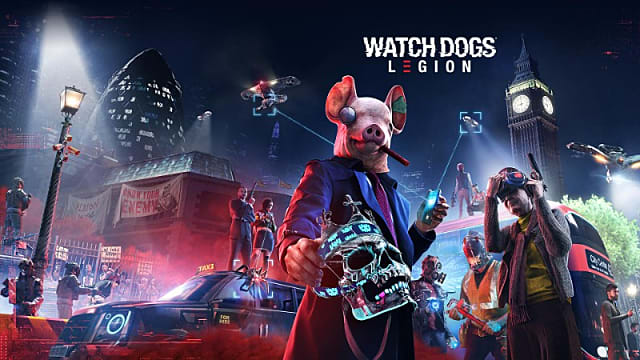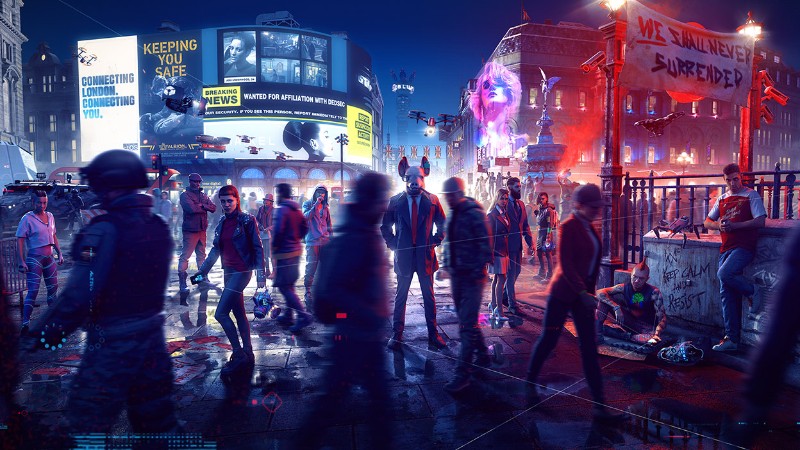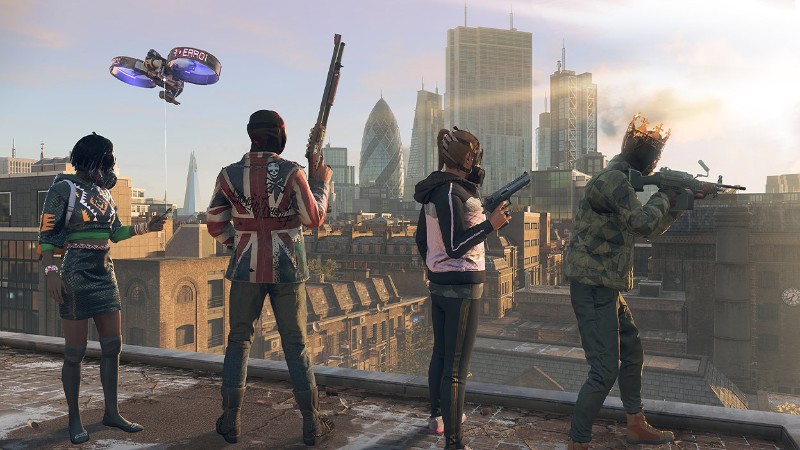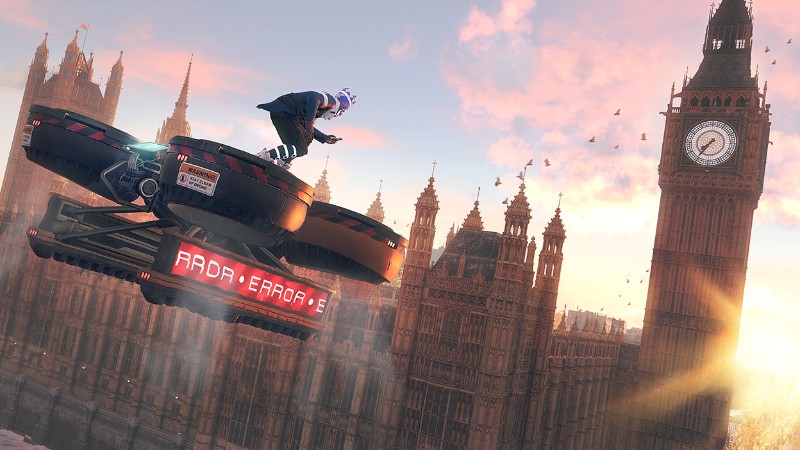As the leading anti-hero in an expansive, bustling, but oppressed society, it’s your job to rally the locals and sabotage the power structures wrongfully put in place by tyrants. In the process, you lead your grassroots resistance to self-liberation, region by region, until the shackles around your collective wrists have been shattered into scrap metal.
Sounds like a Ubisoft game, right? The developer-publisher has iterated again and again on this familiar premise across a number of massive franchises over the past decade. From the dense jungles of Far Cry to the countless historical uprisings in Assassin’s Creed and the post-epidemic The Division, Ubisoft games have asked the outnumbered good guys to chip away at despots until there’s nothing left of them.
You’d be forgiven for thinking Watch Dogs: Legion is more of the same. But poke around under the hood of this ambitious systemic story vehicle and you’ll see the team has thrown out a lot of what’s been so safe in favor of something special.
Watch Dogs: Legion Review — Deconstructing the Sandbox
It’s the act of learning about these new characters and injecting yourself in their lives that feels so different from anything open-world games have done before.
Watch Dogs: Legion feels like it throws out the Ubisoft playbook, though you won’t know it right away. For the first few hours, things can feel dishearteningly similar to the last Watch Dogs game, or any number of open-world sandbox games since the 360/PS3 era for that matter. The game looks fine but never exceptional, perhaps because it’s set in overcast London and doesn’t get a chance to quite literally shine.
Voice acting is on par with what you’d expect from this type of game: everyone is serviceable, no one is exceptional. Cars drive reliably and a bit arcadey, just as they did in Watch Dogs 2. Many of the game’s central mechanics, like a suped-up smartphone that can hack your world in countless ways and a friendly spiderbot that is once again overused, all reappear. Initially, this is Watch Dogs just as you left it.
Until it isn’t.
The brilliance of Watch Dogs: Legion begins to manifest once you begin recruiting other characters. The city is bustling with Londoners going about their lives, and you can play as anyone you wish. Each of them brings their own special skills and backstory to your growing resistance movement in a way that rarely seems to repeat.
There are many archetypes, like a hitman, a panhandler, a nanobot beekeeper, even guards for the game’s evildoing organizations, and at any point, you can try and get them to join your team.
Some require more work than others, as they may not yet be amenable to joining a hacker collective. Others await your call. In any event, it’s the act of learning about these new characters and injecting yourself in their lives that feels so different from anything open-world games have done before.
Once you unlock the Deep Profiler tech ability, you can see exactly where in the world characters will be at all times of day. Visit them during their work hours and they’ll be there in uniform. Stalk them late at night and they may be heading to the bar or volunteering at a homeless shelter.
Every character has their own schedule, and every schedule allows for exciting possibilities. You can win over police officers by taking down a drug-smuggling operation they had been planning to bust, or you can convince a guard for Albion, the game’s tech-heavy bad guys, to join the movement by following him to his date, then recruiting his girlfriend first.
It’s not just these new tools that separate Legion from the decade of sandboxes that came before it. Because these tools play such an important role in the game, the overworld behaves unlike other Ubisoft games. The publisher’s influence over the genre has been monumental, and today even outside its own walls, games like Batman Arkham and Horizon: Zero Dawn replicate their once-signature design.
But in Legion, the era of cluttered maps filled with main, secondary, and tertiary quests is largely ignored in favor of emergent moments.
There’s still a mainline plot to follow, but there are very few repeatable tasks the likes of which we’ve seen in so many games of this nature before. Taking over a district takes just four missions and rewards you with uniquely skilled operatives for the cause each time, making it not just a much more streamlined system but a more rewarding one than the games that had you topple the umpteenth enemy base within an hour or two of playtime.
The engine of Legion is the recruit system. Because every person in the city has their own skills, tackling missions with anyone can feel like trying out new builds in an immersive sim such as Dishonored or Deus Ex. World design allows for a player-driven story in a way Ubisoft has simply never offered in any of their games.
You can scale structures and drop in from above, use a cloaking device and move from cover to cover, or send in a drone to do your dirty work while you sit idly across the street. In some situations, you can dress for the job you want like Agent 47, such as construction workers who can freely roam hostile territories where there is work being done.
These are just a few of many examples. Each new teammate reveals new possibilities. If there’s a downside to it all, sometimes it feels like it’s simple enough to go in with your invisibility cloak with any character and succeed. Because of that, you kind of have to want to mix things up, or else you risk steering yourself into something much more similar to the past games.
I also wished for more interiors, as many times I’d follow a recruit to an area but couldn’t follow them indoors. This seemed like a limitation brought on by the cross-gen release of Legion, and I fully expect the next game to introduce even more scenarios by opening new doors, literally.
Watch Dogs: Legion drastically revises the Ubisoft open-world blueprint it has leaned on for over a decade.
It’s optional, but the permadeath option only enhances Watch Dogs: Legion. Because everyone can be on your team, it’s only sensible that they can just as swiftly be removed. The possibilities for role-playing are endless in Watch Dogs: Legion, and while the game was often advertised with the funny idea of loading out with a squad of only purse-swinging grandmas, it’s much more enjoyable to mix up your team with a long list of heroes of all sorts.
On my team right now I’ve got an investigative reporter, a homeless person, a former getaway driver, a hardcore hacker, and a doctor, among others.
Everyone brings their own tools to the group, making every mission a puzzle with multiple solutions. Experimentation reigns in London. You mourn losses not because of their personalities, but because of their skills. I was crushed when I lost my construction worker because it meant his unique skill of calling in a drone big enough to transport humans died too.
This gives every mission an exciting urgency, especially when so many of the DedSec tools are non-lethal by default. It’s like you’re outnumbered and outgunned always. Following the last game’s disconnect between supposedly white-hat hackers who shot up their city, it now appears possible to play the entire game without ever killing anyone. It’s most stunning of all to see how rarely you even need to take out a weapon of any sort when Watch Dogs: Legion is played deliberately and stealthily.
One holdover from the outgoing Ubisoft generation is the game’s muddled messaging. The publisher has rightfully been taken to task over its fence-walking approach to depictions of sociopolitical upheaval, and that continues in Legion.
The environmental storytelling is clearer than ever, as anti-fascist outcries, burning displays of dissidence, and the Big Tech villains all seem to have something to say, but the game never grapples with all its philosophical musings in an interesting way.
Through three games now, we are told that those who have the keys to our digital kingdom are bad, but the series never inspects the reverse-engineering DedSec does with those same tools. Do we need these same tools to fight our oppressors? Can we use the system for wholehearted good, or do we accept only a lesser bad?
There’s a lot to be said of modern data privacy concerns, digital human rights, and the threat of automation. Legion, like its prequels, teases something important to say but only ever clearly states “fascism bad.” Of course it is, so what else have you got?
Watch Dogs: Legion Review — The Bottom Line
Pros
- Reimagines the Ubisoft sandbox with intricate new systems
- Deep Profiler tech makes every person interesting
- Eschews years of cluttered maps for more emergent, immersive sim-style missions
Cons
- Still muddles its political message beyond “tyrants are bad”
- Very easy to miss the best parts
Watch Dogs: Legion drastically revises the Ubisoft open-world blueprint it has leaned on for over a decade. It’s a daring game for that reason alone, but more importantly, it serves to be a proof-of-concept for what might come from this team and others within the company that can iterate on these new systems.
The ability to play as anyone and have them feel like real people with unique skills and backstories is engaging for dozens of hours. While I’m still waiting for one of these games to say something meaningful regarding their tinderbox political backdrops, the gameplay systems are interwoven smartly and deeply, making Watch Dogs: Legion the next major leap for open-world games.
Future games will be built upon the groundwork laid out in London.
[Note: Ubisoft provided the copy of Watch Dogs: Legion used for this review.]











Published: Oct 27, 2020 03:46 pm